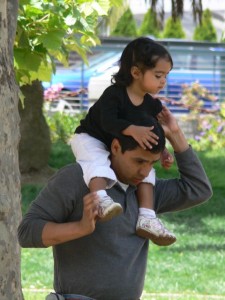|
|
May 14, 2014
 Let me try to make it better Unless this is your first visit here, you know I’m all about teaching kids to be good people. What form of “goodness” am I after? Who cares? Good is good. Let’s not quibble.
If I had to choose one flavor of goodness over another, however, I’d say I’m partial to the kind that connects us to the suffering of others with a grip so powerful that we simply cannot resist the temptation to do something to try to make the other guy feel better. This is compassion. Not complicated and yet, in many homes, schools, city streets, compassion seems to be MIA. Why is that? I’ve got a theory. (Unless this is your first visit, you also know I’m very generous with my theories.)
OK, here’s how it works: Within me (and each of you) is a vat overflowing with opinions, assumptions, fears and all the rest of what I secretly stockpile and use to avoid doing the right thing, which is often a scary thing but at the same time, a good thing. Submerged under the fearsome muck lies a luminous pearl. When you pull the plug and let the bubbling crude drain out of the vat, (which just takes an instant because the conscious act of pulling the plug awakens you to the fact that while your inventory is er… interesting, it’s not really you at all) the pearl emerges and vaporizes your resistance to acting compassionately. Which is a helluva lot more helpful than sitting on your butt and simply feeling compassionate.
Speaking of compassionate acts, I’m reading Glennon Melton’s book Carry on, Warrior. (Great writing. Great book. Read it!) When I came to this part in which Glennon writes a letter to her son preparing him for the social garbage he might encounter in 3rd grade, I stopped and smiled. See if it doesn’t have the same effect on you:
“Compassion might lead you to tell a teaser to stop it and then ask the teased kid to play. You might invite a left-out kid to sit next to you at lunch. You might choose a kid for your team first who usually gets chosen last. These things will be hard to do, but you can do hard things.”
Yep. We can do hard things that help each other. Lucky we have this ability because this trip we’re all on is hard. If it was easy (were easy… thank you, Mom) they’d call it a Day at the Beach. Instead they call it LIFE. So keep your hand on the plug and apply compassion as needed.

May 8, 2014
I don’t usually define something by what it is not, but in this seasonally inspired inquiry: “What makes a good mom?” I feel compelled.
A good mom is not a saint. While most saints were unswerving in their devotion, from what I know about saintly things (very little), not one of them was canonized specifically because of her selfless devotion to her own children. If St. Joan, for example, had been doing laundry, packing school lunches and checking this week’s spelling words would she have had time to take up Charles VII’s call to head up an army and relieve the siege of Orleans from English domination? Somehow I doubt it.
A good mom isn’t Superwoman. All of us are good at some of the things we do. Some of us are even great at one maybe two things. But no mom is good at everything. Not even your PTA president. Sure, she’s an attorney with an MBA. And who could miss that incredible wardrobe and the hair and nails? And yes, she’s got three beautiful, smart and oh-so-well-behaved kids, plus a hunky hubby who adores her. And yes, dammit, she bakes the most beautiful cupcakes ever. But even that woman must have limitations… somewhere.
A good mom isn’t necessarily a biological mother or even a woman. Mom-ness transcends biology. When you really cut into the core of what makes a good mom you find this:
A person who loves the child in his or her care and freely demonstrates that love in countless ways, for a lifetime– through a touch, a word, a look, a joke, a game, a plate of warm food, a cookie, a hug, a smile, a nod, a story, a toy, a warm and open invitation to be whoever you are. A mom communicates acceptance and understanding, support and encouragement in such a way that the child knows he or she is lovable. Through mom’s love, the child learns to love others.
Thank you, moms, for all you do to nurture the children you love.
 Happy Mom’s Day

May 5, 2014
 The kind of friends you can be yourself with Since 1997 a big chunk of my email questions have been variations of…
- What do I do if my friend is nice to me sometimes and sometimes mean to me?
- What do I do if my friend is talking behind my back but then when I confront her about it she says she doesn’t know what I’m talking about?
- What do I do if my friend always has to have things his way and when he doesn’t, he gets kinda mean?”
This morning I did a Skype in the Classroom session with 14 and 15 year olds in Croatia. The topic: Real Friends vs the Other Kind. These kids were polite, respectful and appreciative of our time together. Their English was very impressive! What also impressed me were the questions they asked: thoughtful, honest, revealing. Even though they were so far away, they had many of the same concerns and confusions about friendship as the kids who’ve been emailing me for 17 years. Doesn’t matter if the letter writer is 10 or 19. Doesn’t matter if s/he lives in Detroit, London, Singapore or Zaire. It often boils down to this: “Why is my friend not acting like a friend and what can I do about it?”
We each have to learn the difference between a real friend and the other kind. Sometimes those lessons come with a lot of hurt feelings. Maybe we’d suffer less if, when we are young, we could get help setting concrete standards for behavior in a friendship. Parents and teachers could do a much better job helping us understand that when we pay attention to how we feel when we are with people we can trust, then we will know what it’s like to feel safe, respected and appreciated in a friendship. Trusted adults should also help kids understand that friendship is a 2-way street. We have to hold ourselves to the same high standard of real friendship that we hold other people to. And if they are unable or unwilling to treat us the way a real friend should, then we have the right (and the obligation to ourselves) to take a vacation from that friendship and reach out to other people who share our values.
How do we teach kids the difference between real friends and the other kind?” Watch my 3 minute video answer on Vidoyen.

May 2, 2014
 I’ve got you, sweetie. I had a great dad. Unfortunately, he died of a massive heart attack when I was 15. After that, and for a very long time, I had a massive case of “dad hunger.” So there’s no surprise I was immediately drawn to Keith Zafren’s book How to Be a Great Dad – No Matter What Kind of Father You Had. Right there, in his introduction, he talks about his own “father hunger” and personal journey of healing.
Keith is the founder of The Great Dads Project. He and I connected on Twitter (as so many do) and we swapped books. He was kind enough to write a blog about my work and a separate review of my book, Teaching Kids to Be Good People.
In turn, I read How To Be a Great Dad and interviewed Keith for my weekly podcast Family Confidential. We had a heart-to-heart conversation about how much kids benefit from having a loving, engaged, committed dad in their lives and what they sorely miss when they don’t. We also talked about practical ways in which women can encourage their men to be better dads. The interview really touched me.
Please listen to my conversation with Keith Zafren on this week’s Family Confidential podcast. Share it with the dads you know, as well as the moms. It will help kids everywhere.

| |















